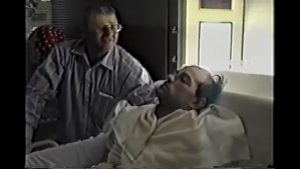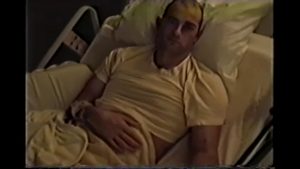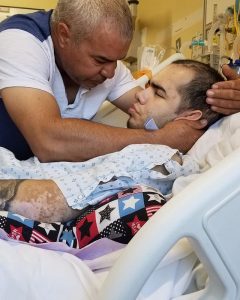Recently I finished a rewrite of a screenplay I’ve been working on this year. I felt a sense of relief after working hard to improve a story close to my heart. Afterward, I wanted to take some time to myself for a breather. Also, I had other projects I needed to work on:
- My blog.
- Future A3 posts.
- New screenplays.
- Articles for Brain Injury magazines.
When I took part in the brain injury awareness month I discovered many resources for persons struggling with brain injuries. One of them was a magazine people could subscribe to. Upon studying the magazine guidelines, I realized they requested pictures to accompany the articles. Problem is I had no pictures from my accident twenty years ago.
Great, I thought, there goes my opportunity to share my story with others with brain injuries. Then I remembered the video of me I had uploaded to YouTube.
I realized I needed to be creative to help get my story out, I pulled up the video on my phone and took screenshots of it and saved them to my phone. This gave me the pictures I needed. I also uploaded them to my social media and used the correct hashtags. I was able to share my story before the articles were even sent to the magazines.

The response from other brain injury survivors and caregivers has been amazing. I connected with the mother of a twenty-two-year-old soldier. Her son, Luis Rodela, sustained a brain injury during training to be an Army sniper. Although they are on the opposite coast, I was able to share my message of struggle and hope with them. Because I know firsthand, the struggle is real.
THE STRUGGLE IS REAL!
During my time writing this column, I’ve tried to be clear the writing and publishing business is not easy. Many other writers both published and unpublished have been honest enough to share with me this career path isn’t easy.
It seems as fast as you learn one facet of the industry, it changes. In real-time, while writers are attempting to utilize the skills they’ve learned, the publishing industry is going through another growth spurt and everything is changing.
It’s a lot like living with a disability; as soon as you overcome one hurdle, life throws you another obstacle to overcome. After you come to grips with that burden, you lose ground in another area of recovery.

Forward momentum is only achieved once we learn how to handle setbacks that are meant to keep us down. Being disabled I’ve learned to use hindrances as fuel to get stronger. Even without a disability, this is life—the struggle is real. This is where the two most important abilities that I shared a few months ago come into play:
- Be flexible: flexibility is the ability to bend when under pressure, when the stresses of life come at us, and not break under the pressure.
- Be coachable: being coachable is understanding you don’t know everything, yet being willing to listen to others who are trying to help you, this requires humility.
I don’t care how great your writing is, how educated you are or how moving your story is—pride can ruin it. Don’t head into a writing career thinking everything will come easily.
Instead, come eager to learn. Come expecting to be pushed. Once you learn to wait and listen, the process becomes easier to manage. Even the best writers must go through the refining process.
I didn’t realize until years after my accident just how miraculous my survival was. I just knew I was alive and foolishly believed I could do anything. I wasn’t prepared for the gruesome and humiliating rehabilitation process.
Nor was I ready for the seizures, endless doctor visits and sometimes painful medical tests. I’ve learned the struggle is indeed real, but I am still here and that’s what matters. What I choose to do with it is my choice.
What’s the Point?
The hard truth is some people never see their writing published. But they keep chipping away at it year after year, anyway. Meanwhile others give up and find other careers for various reasons.
- Lack of patience.
- Lack of resources.
- Lack of training.
- Lack of passion for the craft.
You have a story to tell, so don’t give up.

Photo credit: Juanita Rodela
As I shared with Luis’ family, the road to recovery from brain injuries is long and hard, full of heartache and surprises. Each survivor’s story is different. The key is to focus on what you can do, not what you can’t.
That is good advice for writers as well. We writers, both successful and aspiring, must remain flexible, coachable, and patient to navigate the ups and downs of a writing career.
I leave you with the motto of the professional writing school I trained with—what’s your story?

Martin Johnson survived a severe car accident with a (T.B.I.) Traumatic brain injury which left him legally blind and partially paralyzed on the left side. He is an award-winning Christian screenwriter who has recently finished his first Christian nonfiction book. Martin has spent the last nine years volunteering as an ambassador and promoter for Promise Keepers ministries. While speaking to local men’s ministries he shares his testimony. He explains The Jesus Paradigm and how following Jesus changes what matters most in our lives. Martin lives in a Georgia and connects with readers at Spiritual Perspectives of Da Single Guy and on Twitter at mtjohnson51.




No Comments